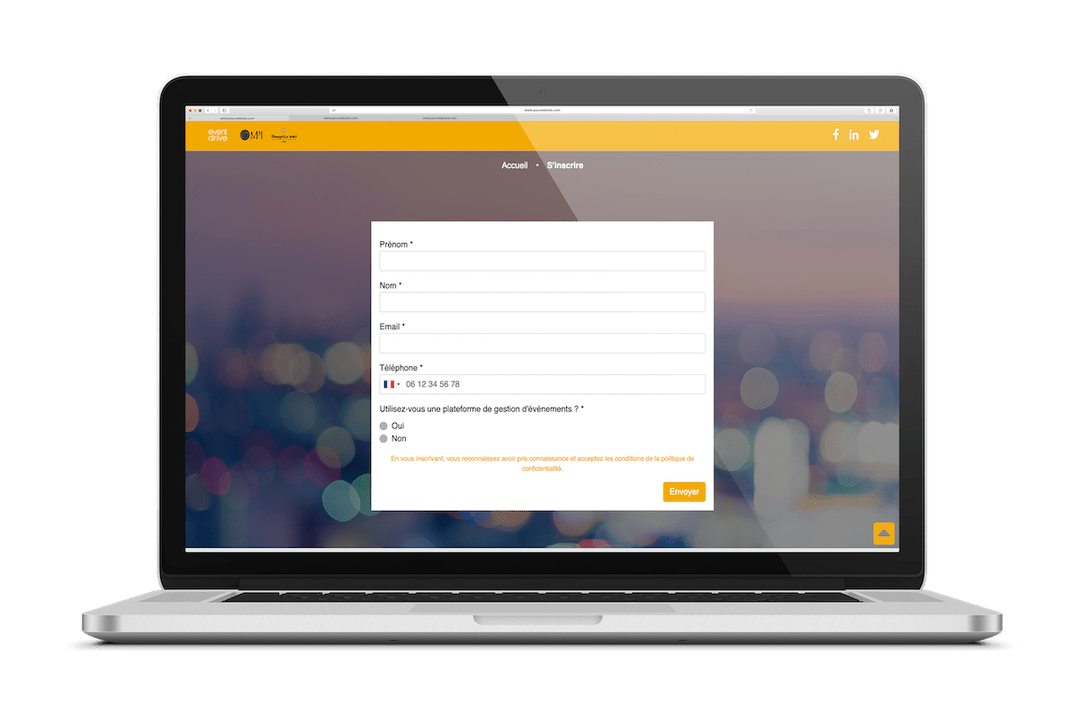5 Essential Tech Components for Successful Event Signups

Planning an event can be a lot of work, especially if your event is geared towards accomplishing a specific goal. For nonprofits, this means generating more donations and engagement with donors, while for associations or businesses, your events might be designed to form new connections with other members or new customers.
No matter what type of event you’re planning, there’s one crucial element shared by all successful events: functional signup or registration capabilities.
Simply put, without a way for guests to let you know that they’re coming, the task of planning a successful and engaging event is made infinitely more difficult. Plus, the registration process can make or break a guest’s impression of your organization. A clunky, inefficient process makes guests think your event might be too, while a streamlined signup process implies you’re good at planning and value the user’s experience from the very start of your interaction.
A great event signup page goes a very long way to both improve your guests’ experience and support your planning efforts. There are a few ways you can make sure your event’s registration process is as streamlined and thoughtful as possible. These are the essential components of a top-notch event registration strategy:
- Website integrations
- Event planning software
- Digital marketing strategies
- Specialized toolkits
- Customization options
As you start putting together your next event to-do list, don’t forget to consider these elements! At DNL OmniMedia, we develop custom tech solutions for nonprofit organizations. In this sector, events must generate a return on their investments of time, money, and effort, and we’ve seen how the right tools can make all the difference.
Let’s get started exploring all the elements at play in a fully-optimized event registration process.

1. Website Integrations
Today, any event that requires an investment of your time and/or money to plan should have its own standalone website, or at least a dedicated page on your site. An integrated event website can make a major difference when it comes to facilitating registration and supporting your marketing efforts.
Our experience is mainly with nonprofit websites (check out some of our favorites here), but web design and integration best practices are just as important for event planning, too. The main idea is to implement user-facing tools on your event site that can report data and transactions directly to your own internal system, usually a CRM or an event planning platform.
Some examples of integrated, user-facing tools include:
- Registration and ticketing tools with payment processing abilities
- Scheduling and agenda customization tools
- eCommerce or other sales platforms
- Peer-to-peer fundraising options or donation tools
When users engage with these tools, whether to register for the event or make a donation, records of that transaction should be automatically saved to your system. These real-time insights mean that your event site can then serve as your most comprehensive and up-to-date reference point for planning and marketing your event.
Many event software solutions offer these sorts of capabilities, but for large-scale events like conferences, expos, festivals, or galas, working with a web design expert can be a smart move. Explore the DNL guide to nonprofit web design for more context on the process that a developer will use to help create a site for your project.
2. Event Planning or Management Software
We already touched on how useful these tools are, but it bears repeating. Dedicated event planning or event management software can be an invaluable asset for events of any size. So what is it, exactly?
Comprehensive event management software should support every step in the planning and execution of your event, both on the backend and on the guest-facing end. It should cover all of these essential areas:
- Project management to streamline tasks on the backend
- Marketing tools to help promote your event
- Event website hosting or other web-integrated tools
- Experience design and management for schedules and layouts
- Post-event analytics and performance trackers
It’s always a good idea to use dedicated tools designed specifically for the task at hand. While you might be able to plan a very small event with simple tools, anything larger requires a more specialized approach. This is especially true when your event is expected to provide your organization with a return on investment, whether that’s through profit, donations, or new leads.
Event planning or management software allows you to take a much more organized, comprehensive, and detailed approach. When it’s time to open registration for the event, you can rest assured that everything will work smoothly because you’ve already been using a set of tools designed to work together.
Your event software might integrate with your underlying CRM to help you more fully manage all the data you generate, or it will offer web-integrated tools to cover the benefits of integrated event sites we discussed above. Choose event management software that offers all the features you’ll need and works with any of the essential tools you already use.
3. Digital Marketing Strategies
Your approach to digitally marketing your event can make or break your registration process. At a very basic level, for your event to succeed at all, potential guests must know a few things:
- That you’re having an event
- That they can register for it online
- How they can register for it online
These might seem a little self-evident, but it can be easy to take these for granted until it’s too late. Your digital marketing and communication strategies should serve to communicate this information and funnel guests through the registration process.
Using the right digital marketing strategies to encourage more interaction with your signup process is extremely important. For promoting events, the most reliable techniques include:
- Creating a dedicated event website with integrated registration tools. This gives you a specific place to direct your online audiences on social media or via email. You might create multiple landing pages in order to track the performance of your different marketing channels, but just make sure all of your registration data is still being recorded in the same place.
- Emailing specific segments of your contact list. Segment your email list by any number of categories, and develop messages specific to them. Donors or customers who you haven’t seen in a long time might respond best to a special deal on tickets, for example.
- Using social media to generate more engagement with your event beforehand. Digital content like articles and videos are great for getting your audience excited, but you’ll need to clearly direct them to your event site’s registration page.
Again, using dedicated software to help manage your digital marketing efforts is your best bet. An ideal event management platform will include digital marketing tools to help you promote your event and track the results.
Larger-scale platforms for specific sectors can also handle complex marketing campaigns. Many large nonprofits, for instance, use the Luminate Online suite to handle online fundraising and marketing projects all in one place.

You want to become a master of events?
Receive 10 tips during 10 days!
4. Specialized Toolkits
We’ve touched on this essential component of successful event registrations throughout the other sections above, but now we’ll take it a step further. When your events need to generate an ROI via donations, customer acquisition, or new leads, you should be using dedicated tools for the job.
Event management software and digital marketing tools are a good place to start for general event planning. However, there are times when you should look to more niche or sector-specific toolkits:
- If you’re hosting a particular type of event that requires a unique planning or management process. For instance, many nonprofits host auctions but don’t use auction software to plan the event or track bids. Explore the OneCause guide to planning a silent auction for more context on these events and toolkits.
- If your organization has particularly unique needs or doesn’t fit neatly into a nonprofit or business category. Associations are a good example of organizations that benefit greatly from using tools specifically designed for them for managing operations and planning events.
- If you need to make the most of your existing tech infrastructure. The Salesforce CRM platform, for instance, is designed to be customized with apps and integrated add-ons. Event planning, management, and more can be streamlined with top Salesforce apps for nonprofits and businesses alike.
In all of these cases, using a more specialized toolkit can help to increase signups by streamlining your processes and keeping your team more focused on the most important tasks at hand.
Finding workarounds with tools that weren’t designed for your needs is extremely time-consuming; you should be spending more time promoting your event and directing users to your signup page than you should be configuring the signup page itself! Tools designed just for your organization, type of event, or CRM platform will more effectively support your event strategies from start to finish.
5. Customization Options
No matter what kind of event planning, management, and registration tools you use, it’s important to offer plenty of customization options to attendees whenever possible.
Guests increasingly expect streamlined, personalized experiences on the web, so your event signup process should make use of tools that let you offer these options. Some common examples include:
- Ticketing options, like for food and seating arrangements
- Ticket packages or tiers that feature different levels of perks
- Scheduling and session customization tools
- Add-ons, merchandise, and donation options
These are just a few of the most common ways that events offer options for guests to customize their registration, but whatever tools you offer should depend on both the type of event you’re hosting and the desires of your target audience.
Complex events like conferences are particularly well-suited to creating personalized experiences for guests and allowing them to customize their schedules. Major events are even beginning to offer mobile apps that contain all the important information, schedules, and options for guests to access from anywhere.
Event apps are a great example of how using integrated tech tools can both deepen engagement and reveal new insights for your team as the event comes to a close. Even if your event doesn’t call for its own mobile app, an integrated event website and the right set of planning and marketing tools will provide the same benefits.
Planning an event is rarely easy work, especially if your event needs to provide a significant return on investment. By using the right tech tools to support your event’s registration process and the guests’ experience, you can make sure you hit your attendance goals and make a great impression.
Whatever tools, platforms, or strategies you use, make sure they fit into one or more of the essential components listed above. Now start planning your next event!
You want to organise impacting events?
Contact us to discover our solution!
- Tips (19)
- Virtual events (18)
- Event planning (14)
- Event communication (13)
- Hybrid events (12)
- Event Performance (8)
- Attendee experience (7)
- Seminars (7)
- Eventdrive (6)
- Other (4)
- Year-End Party (4)
- Conferences (3)
- ERG events (3)
- Invitation Management (3)
- Logistics Simplification (3)
- Post-event management (3)
- Team Building (3)
- Event Security (2)
- Event application (2)
- Event trends (2)
- In-person events (2)
- Product Launches (2)
- ROI (1)
- Registration management (1)